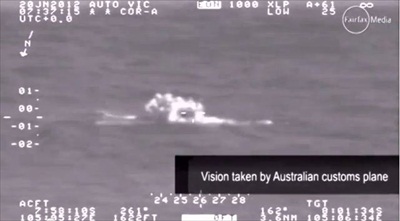Source: The Sydney Morning Herald – July 24, 2013 |
Australia’s search and rescue agency has been criticised in a classified government report as not being proactive enough in helping an asylum seeker boat that had made more than 16 calls for help over two days before eventually capsizing, killing 104 men.
- Video of boat capsize available at the Sydney Morning Herald link above
Relevant:
- The Guardian UK: The night the refugee boat sank: victims tell their stories
The report into the incident, which has been kept under wraps since the tragedy unfolded in June last year, also revealed there was criticism of the Australian Maritime Safety Authority (AMSA) for handing over responsibility for the stricken boat to its Indonesian counterpart BASARNAS knowing that it had limited ability to conduct long-range search- and-rescue operations.
The report by Customs and Border and Protection was tendered in the West Australian Coroners Court on Wednesday during the resumption of an inquest into the sinking of that boat, which became known as the Kaniva or the SIEV 358 on June 21 last year.
 The Siev 358 made at least 16 calls for help before it capsized, killing more than 100 men. Photo: Supplied
The Siev 358 made at least 16 calls for help before it capsized, killing more than 100 men. Photo: Supplied
It is believed there were 214 men on the boat – 210 were from Afghanistan, Pakistan, and Iran and four were Indonesian crew members.
There were 110 men rescued, 17 bodies were recovered and 87 are still missing presumed drowned.
The inquest is inquiring into the identities of the men who died, the cause of the deaths, the circumstances in which the boat sank, the rescue efforts, and communications between BASARNAS and AMSA.
The boat first called AMSA on June 19, saying that it was overloaded with passengers, they did not have any lifejackets and the boat was damaged and taking on water.
Despite the call AMSA determined the boat was not in distress. The details in the classified report emerged during the court proceedings while AMSA manager Alan Lloyd was giving evidence about Australia’s response to the boat’s calls for help. Mr Lloyd said AMSA was in dispute with Customs over sections of the report and had “unsuccessfully” tried to have more input into its findings.
Under questioning from the counsel assisting the inquest, Marco Tedeschi, and the WA Coroner, Alastair Hope, Mr Lloyd admitted that AMSA and its Indonesian counterpart BASARNAS had never got down to discussing the “nitty gritty” of who had what boats and planes that could assist in such a situation.
It has also been revealed in the report – much of which has been redacted – that at the height of the incident AMSA had been told that BASARNAS only had a fibreglass hull boat that could not reach the location of the boat, which was 36 nautical miles south of the Sunda strait and the only Navy ship available was 24 hours away at least and would not be deployed.
However AMSA still requested that BASARNAS take responsibility for the search and rescue coordination.
Mr Lloyd denied any record of that information being given to AMSA.
Mr Lloyd defended the transfer of responsibility for the search and rescue, saying it was the correct thing to do because it was in Indonesia’s search and rescue zone. He agreed that there was no discussion about which country was best placed to coordinated the rescue because that “was not part of the protocol”.
Mr Lloyd told the court it was quite clear that Indonesia had accepted coordination for the incident and it was not up to AMSA to determine what action BASARNAS would take.
“In our world it is clear what the boundaries are for coordination, either you have it or you don’t,” he told the Coroners Court.
But he said in hindsight, “maybe a more embellished conversation should have occurred, but it was correct in accordance with procedures”.
Mr Lloyd has also told the inquest that despite all the phone calls and reports that the boat was travelling at just one knot and at times drifting, AMSA did not consider the boat was in a distress situation and therefore did not issue an emergency broadcast to other ships in the area until days later when the boat was spotted capsized.
The inquest is continuing.
admin
Latest posts by admin (see all)
- ISIS claims gruesome murder of 10 Hazara coalminers in Pakistan - January 5, 2021
- Farewell Hussain Babai - December 20, 2020
- Hazaras categorically reject US-engineered ‘Taliban talks’ in Qatar - September 12, 2020
